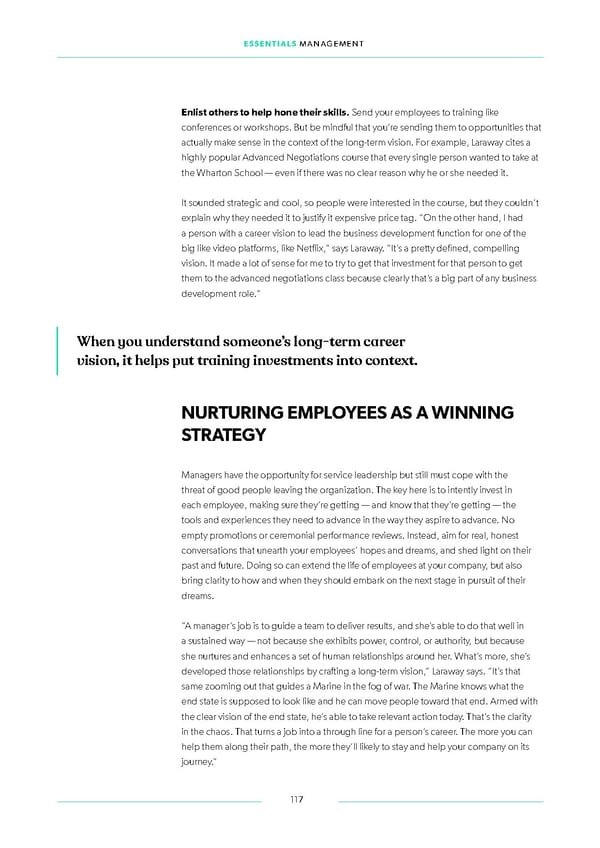ESSENTIALS MANAGEMENT Enlist others to help hone their skills. Send your employees to training like conferences or workshops. But be mindful that you’re sending them to opportunities that actually make sense in the context of the long-term vision. For example, Laraway cites a highly popular Advanced Negotiations course that every single person wanted to take at the Wharton School — even if there was no clear reason why he or she needed it. It sounded strategic and cool, so people were interested in the course, but they couldn’t explain why they needed it to justify it expensive price tag. “On the other hand, I had a person with a career vision to lead the business development function for one of the big like video platforms, like Netlfix,” says Laraway. “It’s a pretty deifned, compelling vision. It made a lot of sense for me to try to get that investment for that person to get them to the advanced negotiations class because clearly that’s a big part of any business development role.” When you understand someone’s long-term career vision, it helps put training investments into context. NURTURING EMPLOYEES AS A WINNING STRATEGY Managers have the opportunity for service leadership but still must cope with the threat of good people leaving the organization. The key here is to intently invest in each employee, making sure they’re getting — and know that they’re getting — the tools and experiences they need to advance in the way they aspire to advance. No empty promotions or ceremonial performance reviews. Instead, aim for real, honest conversations that unearth your employees’ hopes and dreams, and shed light on their past and future. Doing so can extend the life of employees at your company, but also bring clarity to how and when they should embark on the next stage in pursuit of their dreams. “A manager’s job is to guide a team to deliver results, and she’s able to do that well in a sustained way — not because she exhibits power, control, or authority, but because she nurtures and enhances a set of human relationships around her. What’s more, she’s developed those relationships by cratfing a long-term vision,” Laraway says. “It’s that same zooming out that guides a Marine in the fog of war. The Marine knows what the end state is supposed to look like and he can move people toward that end. Armed with the clear vision of the end state, he’s able to take relevant action today. That’s the clarity in the chaos. That turns a job into a through line for a person’s career. The more you can help them along their path, the more they’ll likely to stay and help your company on its journey.” 117
 Essentials Management First Round Capital Page 116 Page 118
Essentials Management First Round Capital Page 116 Page 118